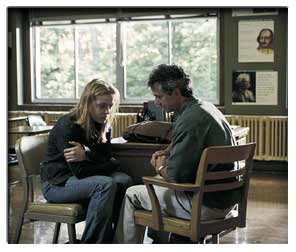There's one particular scene that made Blue Car difficult
for me to watch, and in some ways, difficult to recommend to anyone
unprepared for it. If you have seen it, or know enough about
this film, you'll know what I'm referring to. It's a scene that
is not gratuitous, very honest, and true to the characters and its
story, but its own effectiveness is what makes it so difficult.
Over the years, I've seen maimings, killings, and gore galore in many
a film, and never batted an eye, but one scene of a young girl's
innocent views of love and kindness taken away, and in its place,
filling it with pain and isolation, and my eyes could only avert from
the genuine truthfulness of the moment, not wanting to share in the
pain.
Such is the nature of first time writer-director Karen Moncrieff's
quiet coming-of-age story, Blue Car, which, like the poems
written by an introspective young girl, has an honest approach and
heartfelt delivery that makes it compelling, even if it lacks the
maturity to be truly profound. If a poem can capture a moment,
or a fleeting feeling in a life, so does this movie. There is a
beauty to the way this story is told that is admirable, a simplicity
that is refreshing in this world of overcooked melodramatics.
The main reason why Blue Car works as well as it does lies
in the casting, with two remarkable performances by Bruckner and
Strathairn. Both are commanding in their own way, with Bruckner
delivering complete believability in genuine emotion, while Strathairn
emotes little outwardly, but whose motivations and feelings are easy
to read through his eyes and mannerisms. In some ways, I feel
their performances are almost too good for the story around them, too
complex for the rather simplistic story they are surrounded in.
In the end, a very poignant slice of life film
that gives us just enough moments of moving drama and believable
motivations to make a lasting impression. Although really a film
about children, this is an adult film with adult issues, although the
lesson learned of being skeptical as to the motivations of strangers
and friends should be valuable for teenagers who can handle the mature
subject matter. It's better to learn it from a movie than find
out Meg's way.

 I know a woman who has an eight-year-old
girl, who adores her greatly, spending as much time and energy as her
schedule will permit with her. Sometimes she looks at her
daughter and in a moment of introspection will say, "It's a shame she
has to grow up. I want her to stay my little girl forever."
I know a woman who has an eight-year-old
girl, who adores her greatly, spending as much time and energy as her
schedule will permit with her. Sometimes she looks at her
daughter and in a moment of introspection will say, "It's a shame she
has to grow up. I want her to stay my little girl forever."